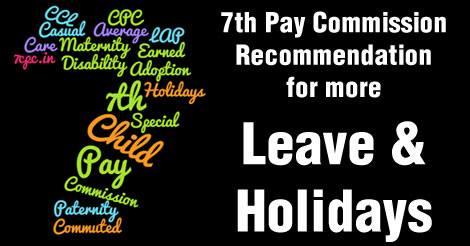
The following paragraphs bring out, the different kinds of holidays and leave admissible, demands received (if any) and views of the 7th Pay Commission on each one of them.
7th Pay Commission – Recommendation for more Leave and Holidays – Presently Central
Government offices observe a five-day week which results in 104 holidays every year on account of weekends.
Presently Central Government offices observe a five-day week which results in 104 holidays every year on account of weekends. In addition, there are three National Holidays, fourteen Gazetted Holidays and two Restricted Holidays. Further, civilian government employees are entitled to 8 days’ Casual Leave, 20 days’ Half Pay Leave (commutable to Medical Leave) and 30 days’ Earned Leave. Besides the above, quite a few other types of leave are admissible.
The following paragraphs bring out, the different kinds of holidays and leave admissible, demands received (if any) and views of the 7th Pay Commission on each one of them. Unless otherwise stated, the existing terms and conditions regulating these holidays and leave shall remain unchanged.
Casual Leave (CL) – Casual Leave is granted to enable a government servant to attend to sudden/ unforeseen needs / tasks. Presently 8 days CL is normally granted to a Central Government employee per calendar year. The number goes up to 10 days for Industrial Workers, 20 days for Defence Officers and 30 days for Defence PBORs. Certain other categories of staff, particularly in the Railways, are granted CL ranging from 11 to 13 days in a year. Demands have been made to increase the number of CL to 15 days for Industrial Workers and 12 days for other employees. CAPFs have also sought parity with defence forces in matters of Casual Leave.
Child Adoption Leave – This leave is granted to female employees, with fewer than two surviving children on valid adoption of a child below the age of one year, for a period of 135 days immediately after the date of valid adoption.
Commuted Leave – Presently, Commuted Leave not exceeding half the amount of half-pay leave due can be taken on medical certificate. A demands have been made to do away with the need for medical certificate.
Child Care Leave (CCL) – Child Care Leave (CCL) is granted to women employees for a maximum period of two years (i.e., 730 days) during their entire service for taking care of their minor children (up to eighteen years of age). There are several demands relating to CCL which include converting the same into “family care” leave, extending the facility to male parents and many representations stressing that it should be extended at least to single male parents. Suggestions have also been received that in cases where the child is differently abled, the clause stipulating that the child should be minor, should be done away with. Single mothers have highlighted their unique problems and requested the Commission for liberalising the grant of CCL. Interestingly, representations have also been made for discontinuance of the CCL, primarily on the grounds that it disrupts office working and also because it promotes gender discrimination.
Earned Leave (EL) or Leave on Average Pay (LAP) – Presently 30 days EL per annum is granted to Civilian employees and 60 days to Defence personnel. EL can be accumulated up to 300 days in addition to the number of days for which encashment has been allowed along with LTC. Suggestions have been made to increase the accumulation to 450 days, allow encashment of 50 percent of the accumulated EL after 20 years of service and delink encashment of leave from LTC.
Paternity Leave – Presently, a male employee with less than two surviving children may be granted Paternity Leave for a period of 15 days during the confinement of his wife, up to 15 days before or six months from the date of delivery of child. Paternity leave may also be granted to a government servant with less than two surviving children on valid adoption of a child below the age of one year, within a period of 6 months from the date of valid adoption. There are demands to increase the period to 30 days.
Maternity Leave – Maternity leave is granted to women government employees–up to 180 days for pregnancy and 45 days in the entire service for miscarriage/abortion. Maternity leave can be combined with any other leave upto two years without medical certificate. The 7th pay Commission has received representations for enhancement of Maternity leave to 240 days with full pay and further 120 days with half pay.
It is noted that Maternity Leave was raised from 135 days to 180 days and ‘period in continuation’ raised from 1 year to 2 years by the VI CPC. No further increase is warranted. Status quo is recommended.
Special Disability Leave – It is admissible to civilian employees when disabled by injury intentionally or accidentally inflicted or caused by or in consequence of the due performance of official duties or in consequence of official position held. Full pay is admissible for the first 120 days and half pay thereafter. The leave may be combined with any other kind of leave due and admissible, provided the total period of leave does not exceed 24 months.
There are demands to remove the ceiling limit of 24 months–the duration of leave may be left to the discretion of doctor and full pay paid for the entire period.
Source: Patrika.com













